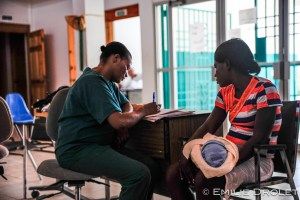
Amongst the challenges the PRISMA project has to face, small victories bring the hope that mothers and children will have access to better conditions in the Artibonite region. Learn more about PRISMA’s adventure through this post written by Martine Bernier, Project Director.
For over three years, the Centre for international cooperation in health and development (CCISD – Centre de cooperation internationale en santé et développement) has been contributing to improving maternal, newborn and child health through the Project for integrated management of maternal and child health in Artibonite, otherwise known as PRISMA.
The PRISMA project is particular in the way it provides support to public or semi-public health facilities. It works with institutions that are located in remote areas, in communes where the populations are small in number and where transportation by road is hazardous. Therefore, the challenges a pregnant woman faces if she wants to give birth in a health centre are multiple since she most likely lives far away, somewhere in a remote mountain.
This is, among other reasons, why PRISMA is such an adventure. Despite strengthening services delivery and quality, despite training healthcare providers and hiring some more to complete the said services and make them available 24/7, despite providing support to a network of Multi-Skilled Community Health Workers as well as to a network of ambulances in each commune to help women in critical situations deliver in a facility, and despite lowering the flat-fee to 100 Gourdes (around CA$ 2.30) in two facilities, the number of facility-based deliveries was not increasing. Statistics, two years after the activities started being carried out, still showed a saw-tooth pattern.
Last July, when we learned that 22 women gave birth at the Anse Rouge Health Centre the previous month, when there were hardly two of them a few months earlier, we knew that we were on the right path. Recently, we have introduced a strategy which relies on the distribution of delivery kits for women who give birth in a facility and in Anse Rouge. What a joy it was to learn that, over two days, eight women gave birth at the commune’s health centre!
Those are small victories, will you say. Small victories compared to the estimated number of pregnant women which is, theoretically, of 130 a month. In fact, it is no more than 16% of these women. However, considering the commune’s local context and given that many barriers have yet to be broken, we are very impressed and motivated by this increase.
How can I describe Anse Rouge? This little community is lost in a landscape that consists of rocks, cactuses, mountains and sea, an arid landscape where artisanal salt mining sites, bayahondes (typical Haitian plants) and countrymen’s shacks stand next to one another. The roads are unpaved and a few of them go far into the mountains. Most often than not, a women that begins her labour can hardly travel all the way to a health centre since she often is at least one or two hours away. This is why it is hard for us to hope they will give birth in a facility.
Drawing on our experience, we know that improving service delivery alone nor only lowering the flat-fee will increase the number of facility-based deliveries. While those strategies must be taken into account, they also have to be combined with other interventions that forge the health centres’ reputation and make it more accessible. Efficient outreach strategies must be implemented in order to strengthen relationships between communities and health facilities. The upcoming months will also help us determine whether or not the distribution of delivery kits as incentives plays a role in increasing the number of facility-based deliveries.
Without a doubt, PRISMA is a great adventure, one that is to be continued!
Originally published on CCISD, September 26th, 2014